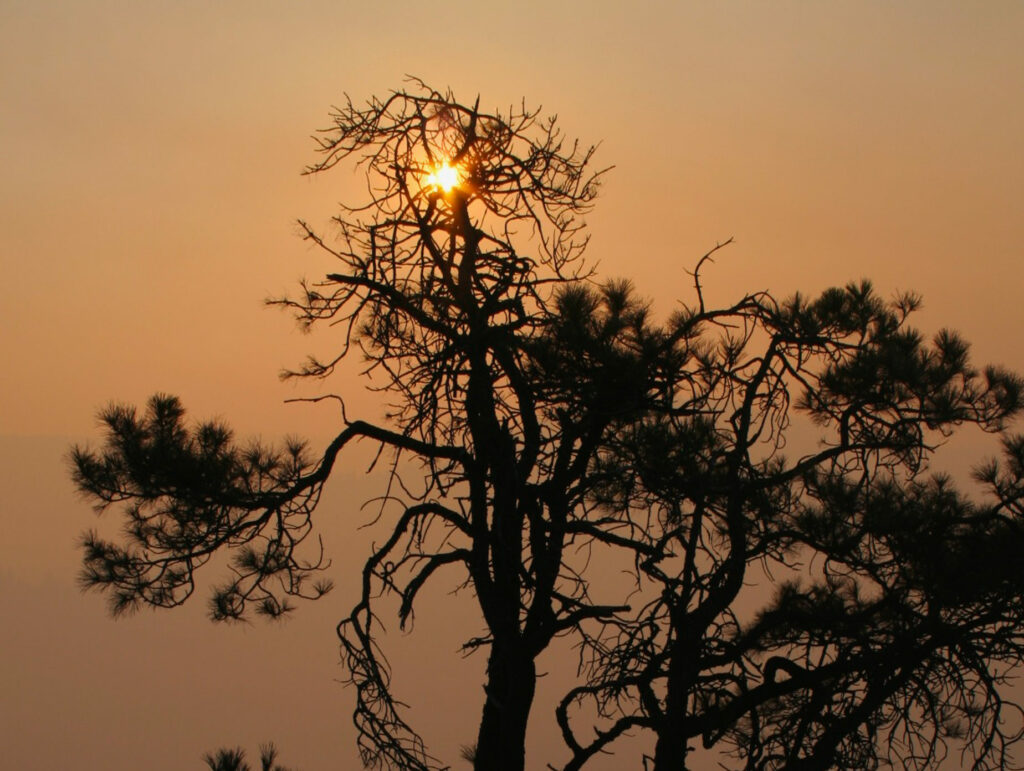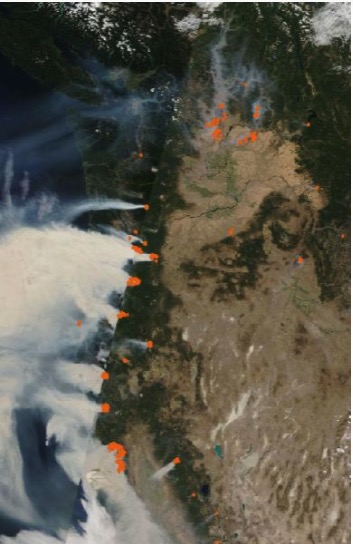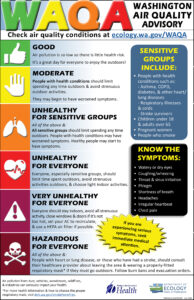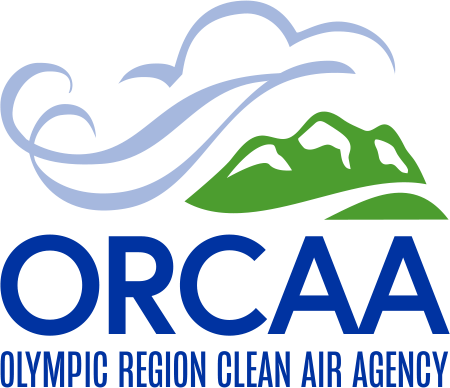
The effects of the extreme winds and heat that blasted the Pacific Northwest on Labor Day continue to be felt throughout western Washington in the form of widespread wildfire smoke.
 Smoke from the fast-growing fires that sprang up over the weekend in eastern Washington inundated ORCAA’s jurisdiction starting Monday night. Then smoke from local western Washington fires – especially those in Pierce County – added to the problem by Tuesday night.
Smoke from the fast-growing fires that sprang up over the weekend in eastern Washington inundated ORCAA’s jurisdiction starting Monday night. Then smoke from local western Washington fires – especially those in Pierce County – added to the problem by Tuesday night.
The weather forecasts for the rest of the week indicate higher than normal temperatures and shifting winds. Unfortunately, even as those redirected winds stop transporting eastern Washington smoke to our area, the wind will likely carry smoke from the rampant wildfires in Oregon into western Washington. Residents of ORCAA’s six counties should expect prolonged periods of ground-level smoke at least through the upcoming weekend.
Today (Wednesday, Sept. 9, 2020), the Washington Air Quality Advisory (WAQA) rating for Clallam, Grays Harbor, Jefferson, Mason, and Thurston Counties is solidly in the Unhealthy for Sensitive Groups range. Pacific County has moved into the Unhealthy range.
See current Air Quality Conditions here: https://www.www.orcaa.org/air-quality/current-air-quality/
 According to the Washington Department of Health (DOH), residents in areas rated as Unhealthy for Sensitive Groups should limit spending any time outdoors and should avoid strenuous outdoor activities. All sensitive groups – for instance, anyone with asthma or other respiratory conditions, seniors, and children – should limit spending any time outdoors. People with health conditions may have worsened symptoms. Healthy people may start to have symptoms.
According to the Washington Department of Health (DOH), residents in areas rated as Unhealthy for Sensitive Groups should limit spending any time outdoors and should avoid strenuous outdoor activities. All sensitive groups – for instance, anyone with asthma or other respiratory conditions, seniors, and children – should limit spending any time outdoors. People with health conditions may have worsened symptoms. Healthy people may start to have symptoms.
In areas with a WAQA rating in the Unhealthy range – currently, Pacific County – everyone, especially sensitive groups, should limit time spent outdoors, avoid strenuous activities outdoors, and choose light indoor activities.
Detailed information from DOH on how residents can best deal with wildfire smoke impacts. That information can be found here: https://www.doh.wa.gov/CommunityandEnvironment/AirQuality/SmokeFromFires
What can I do to protect myself and my family from outdoor smoke?
- CURTAIL ALL BURNING! To reduce smoke, avoid creating any fires, including recreational fires. Every county of the state has some level of fire-safety burn ban and most ban all forms of outdoor burning, including recreational fires. But even where legal, recreational fires should NOT be ignited until fire and air quality conditions improve.
- Check local air quality reports and listen to news or health warnings for your community.
- Avoid physical exertion outdoors if smoke is in the air.
- If you have asthma or other lung diseases, make sure you follow your doctor’s directions about taking your medicines and follow your asthma management plan. Call your health care provider if your symptoms worsen.
- Stay indoors and keep indoor air as clean as possible. Take the following steps when indoors:
- Keep windows and doors closed. Track the air quality and open your windows for fresh air when the air quality improves. Pay attention to the heat indoors and follow the guidance in the section below if it’s too hot.
- Run an air conditioner, set it to re-circulate and close the fresh-air intake. Make sure to change the filter regularly.
- Use an air cleaner with a high-efficiency particulate air (HEPA) filter to reduce indoor air pollution. A HEPA filter will reduce the number of irritating fine particles in indoor air. A HEPA filter with charcoal will help remove some of the gases from the smoke. Do not use an air cleaner that produces ozone. See California’s air cleaning devices for the home fact sheet (PDF).
- Don’t add to indoor pollution. Don’t use food broilers, candles, incense, fireplaces, or gas stoves. Don’t vacuum unless your vacuum has a HEPA filter, because vacuuming stirs up particles already inside your home. Don’t smoke, because smoking puts even more pollution into the air.
- Consider leaving the area if the air quality is poor and it’s not possible to keep indoor air clean, especially if you or those you are caring for are having health problems or are in a sensitive group.
Washington’s complete network of Air Monitoring Stations — including those managed and maintained by ORCAA — and the direct impacts of wildfire smoke can be found here: https://fire.airnow.gov/
Additional information on wildfires and smoke from wildfires is available at http://wasmoke.blogspot.com/
ORCAA will continue to monitor this possible smoke event and will report any changes of note.

